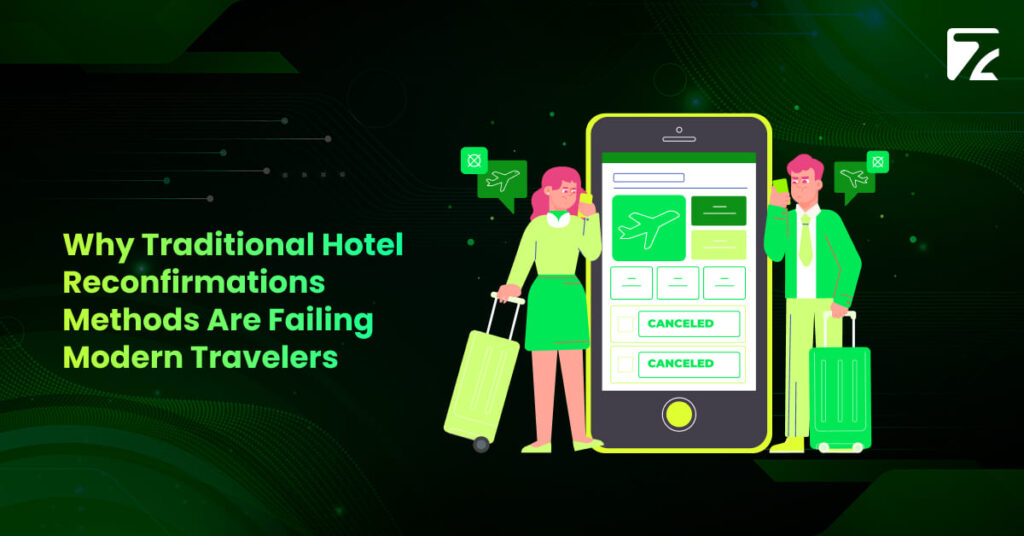Why Traditional Hotel Confirmation Methods Are Failing Modern Travelers

Why Traditional Hotel Confirmation Methods Are Failing Modern Travelers Imagine This: Your OTA processes hundreds of hotel bookings every day. Each booking requires reconfirmation someone must call the hotel to verify the details. Whether it’s an internal team that manages these calls, the result is the same: overwhelmed operators, hotels that don’t answer, time zones that complicate coordination, and human errors that cause booking disasters. Guests arrive to discover their reservations “lost” or wrong. This manual reconfirmation nightmare occurs across the entire travel ecosystem, every single day. What should be a simple verification process has become a massive operational bottleneck, draining resources and damaging customer relationships, regardless of who makes the calls. As an OTA, you’re caught between guest expectations and hotel communication failures. Your platform processed the booking perfectly. The guest received their confirmation. But that critical middle step reconfirming with the hotel is where everything breaks down, leaving you with angry customers, emergency rebooking costs, and damaged reputation. The truth? Traditional hotel reconfirmation processes are not only outdated but they are actively sabotaging your OTA’s growth. While you’ve developed sophisticated booking platforms and pricing engines, the reconfirmation infrastructure running in the background remains trapped in manual processes creating a dangerous gap between what you promise and what you can deliver. What Hotel Reconfirmation Really Means Hotel booking reconfirmation goes beyond the initial confirmation email guests receive after booking. It’s when someone contacts the hotel directly to verify that booking information has been accurately recorded on the hotel’s system. This includes confirming guest names, arrival and departure dates, room types, agreed rates, and any special requests. The scale of this challenge expands with business volume. 25% of properties listed on Booking.com get overbooked within the first year, often due to communication failure between booking and hotel. Every reconfirmation failure can create multiple problems: guest complaints, emergency rebooking fees, staff time spent fixing issues, and negative reviews that hurt future bookings. Why Phone-Based Reconfirmation is Failing The current process relies on human phone calls, which creates multiple failure points. Hotels often don’t receive guest information until close to check-in time, creating a gap between when OTAs show bookings as confirmed and when hotels actually process the reservations. The manual process involves several challenging steps: Navigating different time zones to reach hotels during business hours Overcoming language barrier where necessary with international properties. Waiting through busy phone lines during peak periods Manually recording conversation results Each step can lead to errors, delays, or communication breakdowns. Hotels across different time zones may not update their systems immediately, leading to situations where guests arrive to find their reservations aren’t properly recorded despite having valid confirmation numbers. This becomes worse during busy period like holidays or major event. when both OTA teams and hotel staff are under pressure. The combination of high volume and time constraints often leads to rushed processes and more errors. The Human Limitations Problem Manual reconfirmation faces fundamental human limitations. Operators can only handle a limited number of calls per day, work specific hours, require breaks and make mistakes under pressure. The human element creates several constraints: Operators work specific shifts, requiring coverage across multiple time zones They require breaks, vacation time, and sick leave, creating staffing gaps. They get tired during busy periods, which increases errors They need training on various hotel procedures and languages These limitations are most evident during times of peak booking. During busy travel seasons, the manual system becomes overwhelmed. Hotels receive more calls than they can handle, leading to longer wait times and missed connections. Meanwhile, OTA teams struggle to process increased volume quickly. International booking adds more complexity, requiring staff coverage nearly 24 hours a day. This significantly increases costs, especially for smaller OTAs with limited resources. The Real Cost of Failed Reconfirmations The financial impact goes beyond obvious labor costs, creating both direct expenses and hidden losses. Direct Costs Staff and outsourcing: Manual reconfirmation requires dedicated personnel making repetitive phone calls throughout business hours and often beyond. For large OTAs, this means either dozen of full-time internal employees focused solely on reconfirmations tasks. The cost structure includes not just base salaries or service fees, but also benefits, training, supervision, and the infrastructure needed to support high-volume calling operations. Operational overhead: Time zone requirement force companies to maintain staff across shifts or pay premium rates for round-the-clock services. Language support adds another cost layer, requiring either multilingual staff or specialized service providers for different geographic regions. The complexity of managing these requirements increases administrative overhead significantly. Crisis Management When Reconfirmations fail, OTAs face immediate financial impacts including emergency rebooking costs when arrives to find no valid reservations, compensation payments to affected travelers, expedited resolution fees, and the staff time required to manage crisis situations. These recovery costs often exceed the original booking value and creating cascading operational disruptions. Hidden costs Lost Customers: reconfirmation failures create negative experiences that significantly impact customer retention rates and reduce probability of rebooking. Since customer acquisition costs in the travel industry are substantial, losing customers due to operational failures represents a particularly expensive form of business loss. Every failed reconfirmation is potentially years of future booking revenue lost from that customer relationship. Studies reveal that 60% of consumers found personalised service offers to be “very important to win their business”, clearly emphasizing the significance of service consistency. Damage Reputation: Failed reconfirmations generate negative reviews on travel forum, social media platform, and review sites. The damage from negative publicity often extends far beyond the immediate incident, affecting future booking conversions and requiring expensive marketing efforts to rebuild brand trust. Wasted Resources: The substantial human resources dedicated to manual reconfirmation could be redirected toward revenue generating activities such as customer service enhancement, business development, or strategic initiatives. The opportunity cost of tying up skilled personnel in repetitive reconfirmation tasks represents a significant hidden expense that affects overall business growth potential. How This Affects Modern Travelers Today’s travelers expect reliable, instant service. 80% of global travelers feel it’s important to
